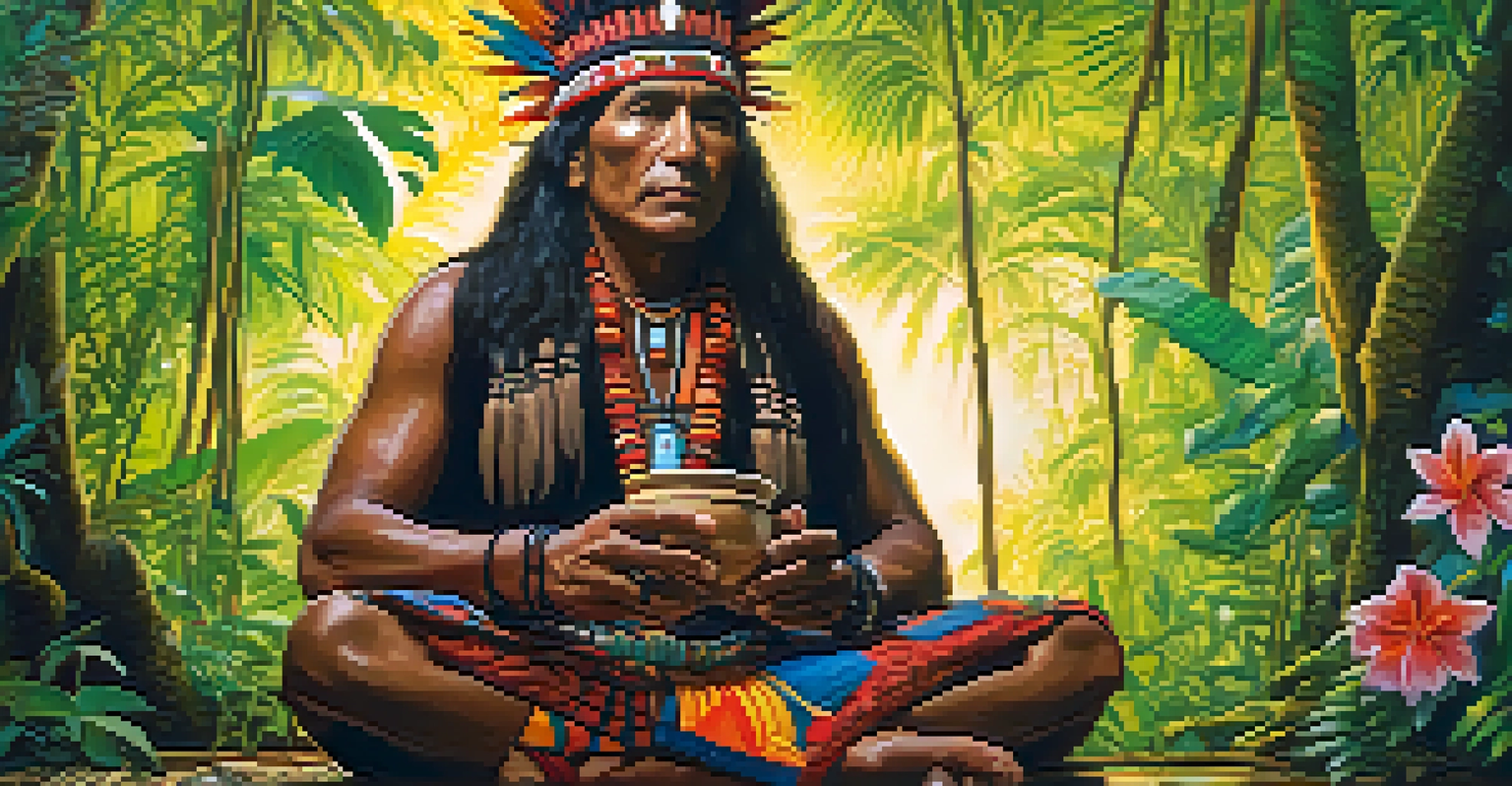Ayahuasca's Role in Shaping Modern Spiritual Practices Today

Understanding Ayahuasca: A Brief Overview
Ayahuasca is a powerful plant-based brew traditionally used by indigenous Amazonian tribes for spiritual and healing purposes. Composed mainly of the Banisteriopsis caapi vine and the Psychotria viridis leaf, it induces altered states of consciousness, often referred to as a 'spiritual journey.' This unique concoction has gained popularity beyond its cultural roots, attracting individuals seeking deeper meaning in their lives.
The experience of Ayahuasca can lead to profound personal insights and emotional healing.
In recent years, Ayahuasca ceremonies have become increasingly accessible to those outside the Amazon region. Many participants report profound personal insights, emotional healing, and a heightened sense of connection to nature and the universe. This surge in interest prompts a closer examination of how Ayahuasca is influencing modern spiritual practices today.
As more people engage with Ayahuasca, it sparks discussions about authenticity, cultural appropriation, and the ethical considerations surrounding its use. Understanding its origins and significance is essential for anyone looking to explore this ancient practice in a contemporary context.
Ayahuasca and the Rise of Neo-Shamanism
The growing popularity of Ayahuasca has given rise to a movement often referred to as neo-shamanism. This modern interpretation blends traditional shamanic practices with contemporary spiritual beliefs, attracting a diverse following. Neo-shamanism allows individuals to explore their spirituality in a way that resonates with their personal experiences and cultural backgrounds.

However, this blend of old and new raises questions about the authenticity of practices and the potential dilution of indigenous traditions. Critics argue that such movements risk commodifying sacred rituals, while others emphasize the importance of personal spiritual exploration. It's a delicate balance that continues to evolve as more people seek meaningful connections through Ayahuasca.
Ayahuasca's Transformative Power
Ayahuasca can lead to profound personal insights and lasting change in participants' lives.
Ultimately, neo-shamanism reflects a broader trend in modern spirituality: the desire for individual paths to enlightenment. Ayahuasca serves as a powerful catalyst for personal transformation, encouraging practitioners to seek their truths while navigating the complexities of spiritual identity.
Personal Transformation Through Ayahuasca Experiences
One of the most significant aspects of Ayahuasca is its potential for personal transformation. Participants often share stories of confronting past traumas, gaining clarity on life decisions, or experiencing a profound sense of interconnectedness. These experiences can lead to lasting changes in one’s outlook on life, relationships, and overall purpose.
Engaging with Ayahuasca responsibly means acknowledging the complexities of its cultural context.
For many, the insights gained during an Ayahuasca journey can be life-altering. They may find themselves motivated to pursue new paths, engage in self-care practices, or foster more meaningful connections with others. This transformative power has made Ayahuasca a focal point for those seeking growth and healing in an increasingly chaotic world.
Moreover, the process often emphasizes the importance of integration—how to apply the lessons learned from Ayahuasca in everyday life. This focus on integration has given rise to various workshops, support groups, and resources aimed at helping individuals navigate their post-experience journeys.
The Intersection of Science and Spirituality
As interest in Ayahuasca grows, so does the exploration of its effects from a scientific perspective. Researchers are increasingly studying the brew’s impact on mental health, particularly its potential benefits for conditions like depression, PTSD, and addiction. This intersection of science and spirituality offers a compelling lens through which to understand Ayahuasca's role in modern healing practices.
Studies have shown that the active compounds in Ayahuasca can promote neuroplasticity—the brain's ability to rewire itself. This phenomenon may explain some of the profound changes participants experience, making scientific inquiry a valuable tool for understanding these spiritual practices. As more research emerges, it could help bridge the gap between traditional wisdom and contemporary therapeutic approaches.
Cultural Respect Is Essential
Engaging with Ayahuasca requires awareness of its cultural origins and a commitment to ethical practices.
However, it’s essential to approach these findings with caution. While scientific validation can enhance understanding, it should not overshadow the cultural significance and personal experiences that shape the Ayahuasca journey. Balancing both perspectives allows for a more holistic view of its role in modern spirituality.
Cultural Appropriation and Ethical Considerations
With the rise in popularity of Ayahuasca, discussions around cultural appropriation and ethics have become increasingly relevant. Many indigenous communities view the misuse of their traditional practices as a form of exploitation, leading to calls for respect and understanding of their cultural significance. It’s crucial for participants to approach Ayahuasca with awareness of its origins and the people who have preserved its rituals.
Engaging with Ayahuasca responsibly means acknowledging the complexities of its cultural context. This includes seeking out authentic experiences led by qualified practitioners who honor traditional methods. Such awareness fosters a more respectful relationship with the plant medicine and those who have long revered its power.
Ultimately, the conversation around Ayahuasca is not just about personal exploration but also about fostering a sense of community and respect for its roots. By engaging thoughtfully, practitioners can contribute to a more ethical and inclusive spiritual landscape.
Integration Practices After Ayahuasca Journeys
Integration practices are crucial for anyone who has experienced Ayahuasca. These practices help individuals process and incorporate the insights gained during their journey into everyday life. Techniques such as journaling, meditation, and participating in support groups can facilitate a smoother transition back to daily routines.
Many find that sharing their experiences with others who have undergone similar journeys can be incredibly beneficial. Support networks often provide a safe space to explore feelings and thoughts that arise post-ceremony. This communal aspect reinforces the idea that spirituality is not just an individual pursuit but a shared experience.
Integration Enhances Spiritual Growth
Post-Ayahuasca integration practices help individuals process their experiences and foster ongoing personal development.
Moreover, the process of integration encourages ongoing self-reflection and personal growth. It empowers individuals to take ownership of their journeys, fostering a deeper connection to themselves and their spiritual paths long after the Ayahuasca experience has ended.
Future Trends in Ayahuasca and Spiritual Practices
Looking ahead, the role of Ayahuasca in shaping modern spiritual practices is likely to evolve further. As more people seek authentic experiences and deeper connections, there may be a greater emphasis on community-based rituals and support systems. This shift could help mitigate concerns about commodification and cultural appropriation while fostering genuine engagement with the tradition.
Additionally, as scientific research continues to uncover the benefits of Ayahuasca, it may pave the way for broader acceptance within mainstream healing practices. This could lead to more integrated approaches that combine traditional wisdom with contemporary therapeutic modalities, allowing for a richer understanding of spirituality and healing.

Ultimately, the future of Ayahuasca in modern spirituality will depend on a collective commitment to respect, understanding, and ethical engagement. By honoring its roots while embracing the potential for personal transformation, Ayahuasca can continue to inspire meaningful spiritual journeys for generations to come.